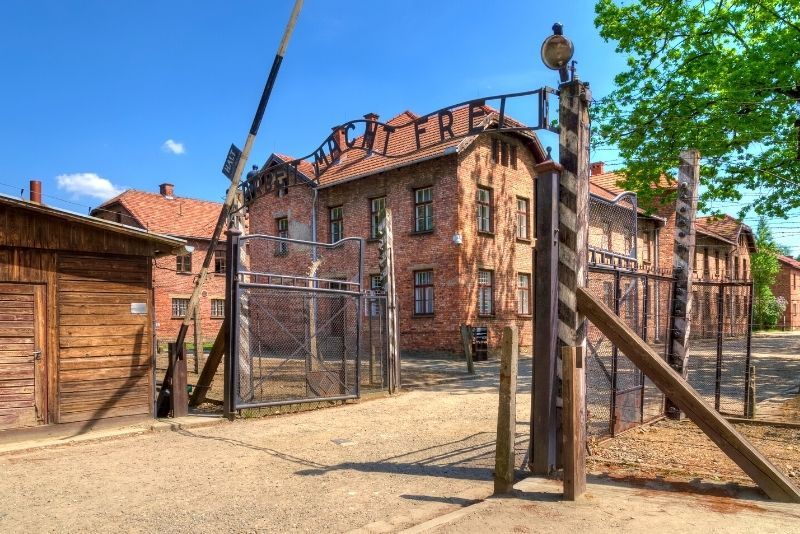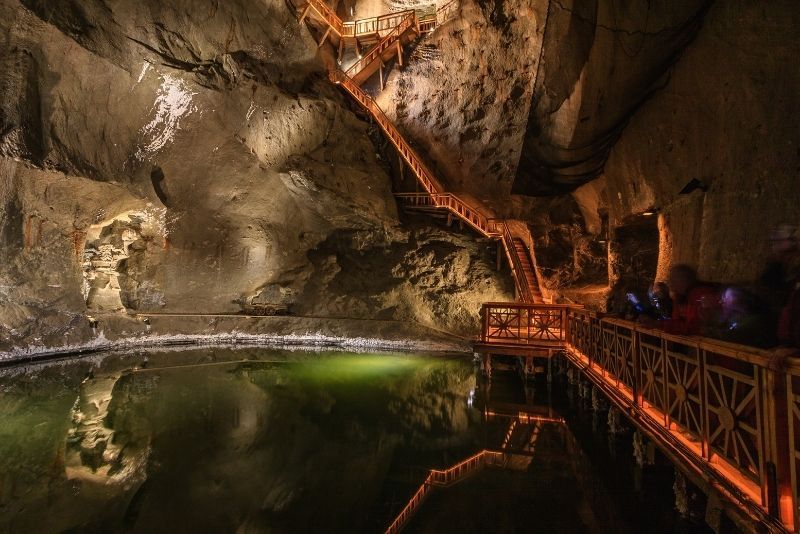Auschwitz: Day Trips and Tours from Kraków
Take a journey back in time to Auschwitz, the largest concentration camp run by the German Nazis during the Holocaust in the 1940s. The haunting complex is over 60 kilometers from Kraków, making it a quick and easy day tour from the Polish city.
While on your day trip to Auschwitz, you’ll learn the dark history of the campsite in the museum, visit the memorial and pay homage to the lives lost in the genocide of European Jews.

You will find below all you need to know about visiting Auschwitz, one of the most striking day trips from Kraków.
How to get to Auschwitz from Kraków?
From Krakow to Auschwitz by car
The road trip from Kraków to Auschwitz can be completed in under 1.5 hours. Head west out of the city center before hopping on the DK7 highway for about 30 minutes. From there, you’ll continue onto the A4, where you’ll pass through Tenczyński Park. Finish your route on the DW933 before arriving at Auschwitz.
From Krakow to Auschwitz by train
The train from Kraków to Auschwitz leaves from the city’s main station and takes about 2 hours. Board the red REM line and ride for 17 stops before arriving in Oświęcim. From there, you’ll have the option to walk for about 15 minutes or ride either the 3, 4, 27 or 28 bus to the concentration camp.
Guided tour to Auschwitz from Krakow
The best way to learn about the harrowing history of Auschwitz is through a guided tour from Kraków. These excursions will provide ease of transportation, as well as insightful information from an expert guide. Many tours will also include a stop along the way for lunch or a visit to the Wieliczka Salt Mine.
How much does the entrance ticket to Auschwitz cost?
Admission to the Auschwitz Memorial and Museum is free, though you will need to make a reservation online prior to your arrival.
You may also opt for an in-house guided tour of Auschwitz. A professional educator will lead you through the memorial and museum with narration provided through a set of headphones. All guided trips include a tour of Auschwitz I and Auschwitz II-Birkenau.
Reservations for a guided tour must be made on the Auschwitz website up to five days before your visit, or by email between two and five days ahead of your arrival.
What is the typical itinerary of a day tour from Kraków to Auschwitz?
A day trip from Kraków to Auschwitz will last between 3 and 11 hours, depending on how many stops you choose. A typical itinerary will begin with the convenience of a Kraków hotel pickup in the morning before embarking on the 1.5-hour ride to the concentration camp.
From there, you will begin your 3.5-hour tour with a professional guide who will lead you through the two German Nazi camps of Auschwitz and Birkenau.
After your excursion, you will return to the air-conditioned bus and ride back to your desired drop-off location.
Longer tours might include a 2-hour visit to the Wieliczka Salt Mine on the route back to Kraków.

What kinds of tours are available to go to Auschwitz from Kraków?
There are several options for tours from Kraków to Auschwitz, with many including additional stops along the way. Millions of people visit the Auschwitz Memorial and Museum a year, so opting for a guided tour is a great way to fast-track your trip and add ease to your journey.
Guided Tours from Kraków to Auschwitz
A cost-efficient and convenient way to see the largest concentration camp is by a guided tour from Kraków. On this trip, your group size will be around 15 people, and you will have pickup and drop-off services at the location of your choice. you’ll be picked up and dropped off at locations of your choice.
You will visit both the memorial and the museum while learning about the tragic history of the landmark. You will also receive headphones so that you’ll be able to listen to detailed descriptions from an expert guide.
Day trip to Auschwitz plus Wieliczka Salt Mine from Kraków
Many tours of Auschwitz from Kraków will also include a stop at the Wieliczka Salt Mine, a world UNESCO World Heritage site. After a 3.5-hour guided exploration of Auschwitz, you’ll stop to see the amazing statues and chapels carved in salt by former miners.
Day trip to Auschwitz plus Oskar Schindler Factory tour from Kraków
On this day trip, you’ll have the opportunity to tour Auschwitz and Oskar Schindler Factory. The historic enamel factory was represented in the beloved film “Schindler’s List” where the founder saved over a thousand lives during the Holocaust.
Private tour to Auschwitz from Kraków
For a more personal experience, opt for a private tour of Auschwitz. You’ll be picked up by a private air-conditioned car where you’ll screen a film about the concentration camp during the journey to the site. From there, an English-speaking guide will lead you through Auschwitz Memorial and museum, with all entrance fees included.
How much does a tour to Auschwitz from Kraków cost?
There are many options for tours to Auschwitz at all price points. A guided tour to the concentration camp from Kraków will cost between €20 and €45 per person, depending on the size of the group.
A day trip to Auschwitz from Kraków, including a stop at the Wieliczka Salt Mine, costs around €80 per person, but will feature a 2.5-hour guided tour of the fascinating UNESCO site.
If you’re a fan of “Schindler’s List” and you’re hoping to stop by the Oskar Schindler Factory on your jaunt to the concentration camp, you can expect to pay about €80 per person.
A private tour of Auschwitz will cost somewhere between €100 and €200 per person, with the more expensive options which include stops at the Wieliczka Salt Mine or for a midday lunch.
What will you see and do on an Auschwitz day trip from Kraków?
While on a day trip to Auschwitz, you will embark on the 1.5-hour ride to the concentration camp from Kraków. On private excursions, you will be able to watch a documentary about the concentration camp to prepare you for your tour.
Auschwitz and Birkenau Museum and Memorial
Once you arrive at the Auschwitz and Birkenau Museum and Memorial, you will receive headphones for an audio guide, and you will see first-hand the sites of the largest European concentration camps from the devastating Holocaust.
Wieliczka Salt Mine

On day trips that include a stop at the Wieliczka Salt Mine, you will spend 2.5 hours exploring one of the most unique UNESCO World Heritage sites. You will have the opportunity to discover chambers covered in salt and view monuments created by the Jewish forced laborers who worked there.
Oskar Schindler Factory
If you choose a tour that stops at the Oskar Schindler Factory, you’ll get to take a chilling look at the historic enamel factory where Oskar Schindler saved over a thousand lives during the Holocaust. His heroic World War II efforts were brought to the forefront of fame with the creation of the award-winning film “Schindler’s List.”
When is the best time to visit Auschwitz?
It is best to visit Auschwitz in the warmer months of May to September when temperatures reach 17 degrees Celsius during the day and drop to 9 degrees Celsius at night.
However, if you would prefer to avoid large crowds, plan your visit for spring (March to April) or fall (September to October.)
The Auschwitz Museum is open seven days a week for the whole year except for New Year’s Day, Christmas Day and Easter Sunday. The exhibit opens every day at 7:30 AM.
Closing times vary according to seasons:
- June, July and August: 7 PM
- April, May and September: 6 PM
- March and October: 5 PM
- February: 4 PM
- January and November: 3 PM
- December: 2 PM
It is best to begin your visit earlier in the day, as the museum and memorial tours last about 3.5 hours.
Travel tips
- Make sure to prepare for the weather, as you’ll be outdoors for the majority of the visit. Bring an umbrella in case of rain and a hat and sunscreen for extra sunny days.
- Wear sturdy shoes, as the ground around Auschwitz can be rocky and uneven. You’ll also be walking a lot, so choose comfortable footwear for the journey.
- You can get some food from vending machine available outside of the exhibit. Once you enter the gates, you will not have a chance for snacks or water.
- Bring only small bags with you on your trip. The museum and memorial do not allow packs bigger than a carry-on bag.